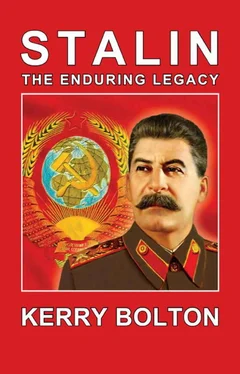Harmful and corrupting petty ideas of bourgeois cosmopolitanism were also carried over into the realms of Soviet literature, Soviet film, graphic arts, in the area of philosophy, history, economic and juridical law and so forth. [109] Ibid.
It seems that these ‘rootless cosmopolitans’ were stupid◦– or arrogant and conceited◦– enough to believe that they were in a State that was still pursuing Marxian ideas, despite the repudiation of all the main tenets of the original Bolshevik regime of Trotsky and Lenin. One, comrade Subotsky had, as presumably a good Marxist, sought to undermine the concept of nationality, and repudiate the idea of the heroic ethos that had become an essential ingredient of Soviet life and doctrine, especially since the ‘Great Patriotic War’ (World War II). Hence Chernov wrote damningly of this ‘rootless cosmopolitan’ whose views on culture seem suspiciously Trotskyite:
The rootless-cosmopolitan Subotsky tried with all his might to exterminate all nationality from Soviet literature. Foaming at the mouth this cosmopolitan propagandist hurls epithets towards those Soviet writers, who want ‘on the outside, in language, in details of character a positive hero to express his belonging to this or that nationality’. [110] Ibid.
The USSR had become a nationalist state founded on the Russian cultural heritage, nationality and traditions; advocating nationalism and folk-culture antithetical to the internationalism and materialism of classical Marxist ideology.
Chernov continued: ‘These cosmopolitan goals of Subotsky are directed against Soviet patriotism and against Party policy, which always has attached great significance to the national qualities and national traditions of peoples’.
Chernov next described an ‘antipatriotic group’ promoting ‘national nihilism’ in theatre criticism, this concept being, ‘a manifestation of the antipatriotic ideology of bourgeois cosmopolitanism, disrespect for the national pride and the national dignity of peoples’.
Chernov directed his attention to individuals of a ‘national nihilist’ tendency in the sciences and philosophy, citing one Kedrov, who had sought to develop a ‘world philosophy’ devoid of ‘national distinctions and features’:
Here, Kedrov’s cosmopolitan orientation is obvious, advocating a scornful attitude toward the character of nations, towards their distinctive qualities, making up the contribution of nations to world culture. Denying the role of national aspect and national distinctive features in the development of science and philosophy, Kedrov spoke out for ‘solidarity’ with reactionary representatives of so-called stateless and classless ‘universal’ science. Meanwhile, the slogan ‘united world science’ is profitable only to our class enemies. [111] Ibid.
Chernov was repudiating any notion of universalism, even in areas of science that are still generally perceived as ‘universal’, as belonging to everybody and nobody, such universalism being seen as a tool of the enemies of the USSR. Chernov cogently warned that ‘rootless cosmopolitanism’ in the name of ‘international solidarity’ has as its goal the ‘spiritual disarmament’ of the Soviet◦– i.e., Great Russian◦– people:
The forms in which bourgeois-cosmopolitan petty ideas are dragged into the area of ideology are multifarious: from concealment of better products of socialist culture to direct denigration of it; from denial of the world-historical significance of Great Russian culture and elimination of respect for its traditions to the frank propagation of servility before decadent bourgeois culture; from the spreading of national nihilism and negation of the significance of the question of priority in science to the slogan about "international solidarity" with bourgeois science and so forth and so on. But the essence of all these forms is this antipatriotism, this propaganda of bourgeois-cosmopolitan ideology setting its goal of spiritual disarmament of the Soviet people in the face of aggressive bourgeois ideology, the revival of remnants of capitalism in peoples’ consciousness. [112] Ibid.
Chernov identified ‘rootless cosmopolitism’ as part of a specific foreign agenda, which was certainly formalised that year◦– 1949◦– with the founding of the Congress for Cultural Freedom:
In the calculation of our foreign enemies they should divert Soviet literature and culture and Soviet science from the service of the Socialist cause. They try to infect Soviet literature, science, and art with all kinds of putrid influences, to weaken in such a way these powerful linchpins of the political training of the people, the education of the Soviet people in the spirit of active service to the socialist fatherland, to communist construction. [113] Ibid.
Despite the necessary allusions to ‘communism’, the context of the article is overtly one of Great Russian nationalism that has repudiated all notions of ‘international solidarity’ and ‘universalism’ as corrosive to the ‘spiritual’ health of the people, nation, state and culture, regardless of the rhetoric used.
That traditional folk culture was the foundation of so-called ‘Soviet culture’ was explained by Chernov in referring to an episode in which the Central Committee of the party had condemned an opera, ‘The Great Friendship’, despite its focus on the traditional music and dances of the Caucasian folk. Stalin in particular was outraged at Muradeli for attempting ‘improvements’, Muradeli having composed one of the ‘traditional tunes’ himself. [114] Central Committee of the All-Union Communist Party, 10 February 1948.
According to Chernov the Central Committee resolution of 1948 had, ‘subjected to a scathing denunciation the direction of some composers who had neglected the great musical legacy of the brilliant Russian composers’. The ‘great Russian musical legacy’ is specifically not that of dialectical materialism, or any other such Marxist notion, but clearly that of traditional folk culture, and no ‘improvisations’, adaptations or new interpretations were going to be acceptable. What becomes clear is that the aim of ‘Soviet culture’ was to create ‘socialist realism’ in the arts uncompromisingly founded on a bedrock of traditional folk culture. As indicated by Trotsky’s art manifesto, Marxists along with liberals and globalists in the West saw something disturbingly similar between Soviet ‘socialist realism’ and ‘Fascist’ art. [115] Actually, the art of Fascist Italy embraced Futurism and other modernist trends, existing side-by-side with a revival of Roman Classicism, and Italy was in this respect more tolerant of artistic innovations than Stalinist Russia. On ‘Futurism’ in Italy see: K R Bolton, Artists of the Right, ‘Marinetti’ (San Francisco: Counter-Currents Publishing, 2012). 32-52
Chernov was predicting what would be a major and long-lasting offensive against the Soviet, at the same time (1949) that Sidney Hook, et al, in league with the CIA, Rockefeller and other such interests, were planning to launch a world cultural revolution founded on what Stalinism was condemning as ‘rootless’ or ‘bourgeois’ cosmopolitanism’. Chernov warned of what is today called the ‘cultural cold war’, stating that this would be part of the ‘ideological weapon’ for the encirclement of the USSR:
The most poisonous ideological weapon of the hostile capitalist encirclement is bourgeois cosmopolitanism. Consisting in part of cringing before foreign things and servility before bourgeois culture, rootless-cosmopolitanism produces special dangers, because cosmopolitanism is the ideological banner of militant international reaction, the ideal weapon in its hands for the struggle against socialism and democracy. Therefore the struggle with the ideology of cosmopolitanism, its total and definitive unmasking and overcoming acquires in the present time particular acuity and urgency. [116] F Chernov, op. cit.
Читать дальше












